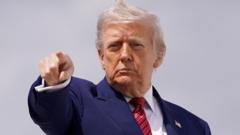In a strategic turn, President Trump has agreed to delay the tariff negotiation deadline with the European Union, aiming to alleviate rising tensions and foster a favorable trade deal.
Trump Postpones EU Tariff Negotiations, Avoids 50% Rate Threat

Trump Postpones EU Tariff Negotiations, Avoids 50% Rate Threat
US President extends deadline for tariff negotiations with EU after threatening steep increases.
In a move that has captured global attention, President Donald Trump announced a postponement to the tariff negotiation deadline with the European Union (EU) following a tense exchange of threats regarding a potential sharp increase in tariffs. Originally set for May 1, Trump has pushed the deadline to July 9 after a constructive conversation with European Commission President Ursula von der Leyen.
Earlier this month, Trump had issued a warning of raising tariffs from 10% to a staggering 50% on various EU imports, expressing dissatisfaction with the stalled discussions. However, following Sunday’s talks, Trump indicated he was willing to extend the timeline for negotiations, suggesting a collaborative spirit going forward.
Both Trump and von der Leyen acknowledged the "very nice" nature of their conversation, with the EU leader affirming the bloc's readiness to engage in swift negotiations. Von der Leyen highlighted the need for ample time to finalize a satisfactory agreement for both sides by the newly proposed deadline.
This extension comes amidst ongoing complaints from Trump regarding the perceived imbalances in trade relations with the EU, which remains one of the United States' largest trading partners. Recent US government data reveals that last year the EU exported goods worth over $600 billion to the US while importing approximately $370 billion, a dynamic Trump has criticized.
Economists warn that Trump's tariff strategy, designed to protect American manufacturing and jobs, risks introducing chaos into the global market. While some tariffs have been temporarily suspended to facilitate ongoing discussions, significant levies on steel and aluminum remain enforced.
As the negotiations press on, the EU remains prepared to counteract any potential adverse actions from the US, having previously signaled intentions to impose its own series of tariffs on American products. European officials stress that both economies would suffer from escalating tariff disputes, advocating for diplomacy over economic strife.
With trade relations hanging in the balance, the world watches closely as the US and EU work toward a resolution in the coming months.





















